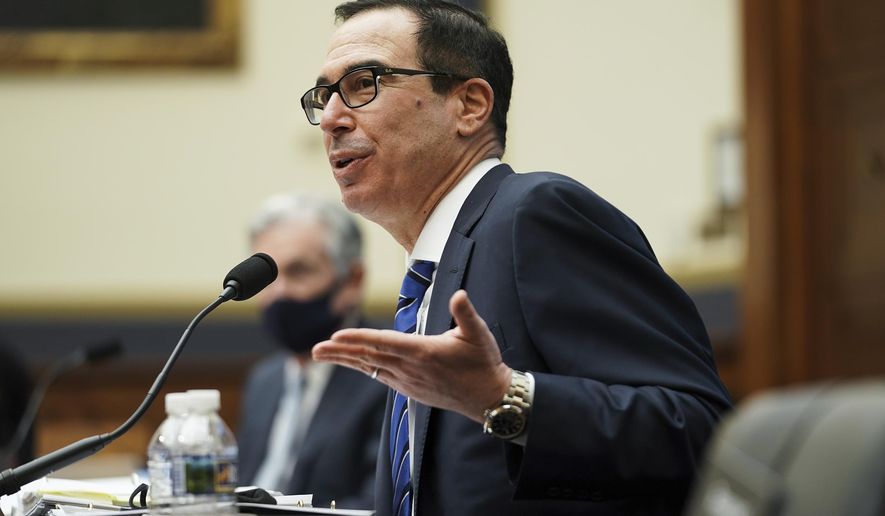The Trump administration on Tuesday proposed a new coronavirus relief package that includes a round of $600 stimulus checks for Americans reeling from the economic shutdowns.
The White House’s $916 billion proposal was sweeter than the bipartisan compromise package and Senate Republicans’ offer, signaling a better shot at a deal before Congress takes its winter vacation.
The proposal, which Treasury Secretary Stephen T. Mnuchin presented to House Speaker Nancy Pelosi, was the first offer from the White House since before the Nov. 3 election.
It upped the ante from the $908 billion bipartisan compromise and put the hot-button items of liability protections for businesses and extra spending on state and local governments back on the table for Republicans.
“It’s a much better product,” said House Minority Leader McCarthy, California Republican, who was briefed by Mr. Mnuchin on the proposal. “I don’t see a reason why Pelosi should be opposed to it.”
He heralded the $600 direct payments as a breakthrough.
Congress approved $1,200 stimulus checks in March but has not been able to agree on another round of direct payments, though President Trump backed the payments in subsequent relief packages.
There were no direct payments in the bipartisan framework, despite bipartisan interest, because there was still significant opposition from Republicans.
Some of the money would come from $140 billion in unused funds from the Paycheck Protection Program and $429 billion would come from Treasury funds.
“I look forward to achieving bipartisan agreement so we can provide this critical economic relief to American workers, families and businesses,” Mr. Mnuchin said.
Still, policy provisions in the proposal gave Democrats pause, such as a reported trade-off of the $300 a week enhanced unemployment payments for those $600 direct payments.
“My initial thought is a negative one,” said House Majority Leader Steny H. Hoyer, Maryland Democrat. “These are people who are stressed, right? They’re out of a job, they’re not getting income. I think targeting to them is a more efficient way of getting money to people in need.”
Hours earlier, Senate Majority Leader Mitch McConnell, Kentucky Republican, suggested dropping the provisions on liability and state and local government aid from the bipartisan coronavirus relief deal because they are the most contentious elements.
Democrats immediately rejected his proposal and accused him of trying to sabotage the deal.
The two issues — opposing top priorities for Democrats and Republicans — have been at the center of collapsed coronavirus-relief deals since the summer.
Republicans remain wary of funding for state and local governments becoming a “bailout” for Democrat-run states and cities where budget woes predate the pandemic.
Democrats argue an infusion of federal dollars is necessary to keep first responders paid and shore up state and municipal budgets hard hit by the shutdowns.
“Leader McConnell’s efforts to undermine good-faith, bipartisan negotiations are appalling,” said Mrs. Pelosi, California Democrat. “What does Leader McConnell have against our heroes? Our health care workers, our first responders and other frontline workers have risked their lives to save lives. Now, Leader McConnell wants them to lose their jobs and our constituents to lose the essential services they provide.”
The White House bid promises to change the posture on both sides of the Capitol.
Lawmakers who endorsed a $908 billion bipartisan, bicameral framework were working feverishly to hammer out details of the deal. They were hung up on a handful of policy disagreements — namely the standoff on liability protections and state and local funding.
Sens. Angus King, a Maine independent who caucuses with Democrats, and Lindsey Graham, South Carolina Republican, have been drafting a compromise for liability protection.
Mr. King said they were “very close.”
Sen. Susan M. Collins, a Maine Republican backing the bipartisan package, said they’re pushing for a deal on both issues.
“Those two issues remain the most difficult to resolve,” she said.
• Gabriella Muñoz can be reached at gmunoz@washingtontimes.com.




Please read our comment policy before commenting.